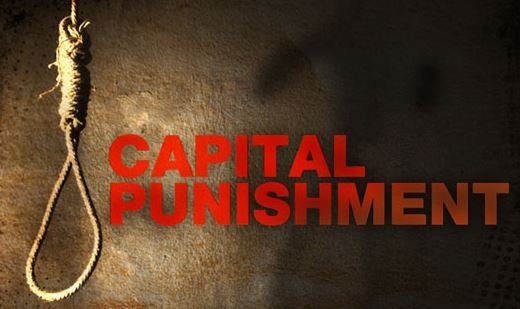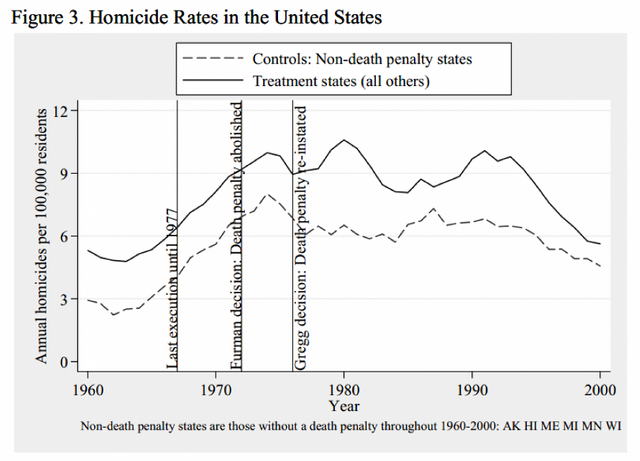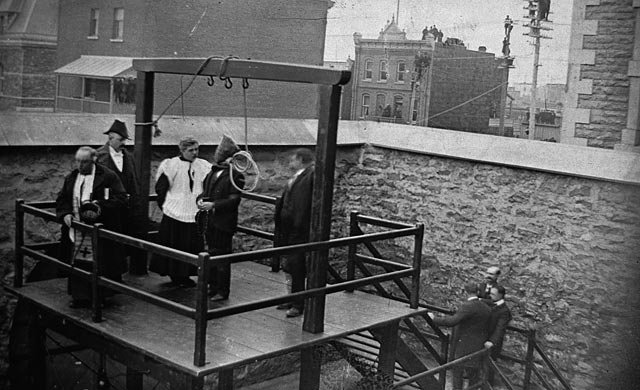THE CAPITAL PUNISHMENT CONTROVERSY - PART 1: THE EFFECT OF DETERRENCE
I have to admit that up to my mid 20s I used to be a big supporter of the death penalty as a means of punishment for certain crimes. After all, in its simplicity, it seems like a very fair method to serve justice: If someone takes a life, it only seems fair that their life should be taken too. Of course if you take a quick look throughout human history (and capital punishment is as old as humanity itself) you will notice that being killed as a punishment wasn't as hard to happen as it is today. In the name of 'justice', people have been killed for petty crimes, their opposition to authority, even for supporting their religious or political views. That creates a whole bunch of questions about the morality behind capital punishment itself.

(Source) - Hanging, one of the most popular methods of capital punishment throughout human history
But the more you look into the pro-death penalty arguments, the more you realize that all of them are full of flaws and misconceptions. I slowly came to the conclusion that capital punishment was never really a rational, logic-based method to punish and prevent crime, but it was mostly there to create an 'illusion' of retribution, and satisfy human emotions such as anger and need for revenge. In this series of articles I will take some of the main arguments in favor of capital punishment, such as morality, deterrence, retribution, legal costs etc and share my views on them. In this Part 1 of the series I have decided to talk about the effect of the death penalty as a deterrence and whether it really serves to prevent further crimes.

THE STATISTICS OF THE DEATH PENALTY
In 1976, the USA Supreme Court, following the case of Gregg vs Georgia, reaffirmed the acceptance of the death penalty as an option for punishment in the USA. In its decision, the supreme court said that:
‘The death penalty serves two principal social purposes—retribution and deterrence.’
In this first part of my ‘Capital Punishment’ articles, I will share with you my views on the most frequently used argument in favor of Capital Punishment: The Deterrence Effect.
The deterrent effect of capital punishment has been studied extensively since the 1970s but statistics have been contradicting. Isaac Ehrlich was one of the first to publish a major research showing an inverse relationship between the number of executions and the murder rates following the execution. According to his research soon after an execution, the homicide rates appeared to drop. Another research published in 2003 by the Emory University showed similar results. On the other hand though, the absolute numbers when it comes to murder rates in the USA, show that states without the death penalty have consistently lower murder rates than states using executions as a means of punishment. In 2014 for example, states using the death penalty had a murder rate of 4.75 per 100,000 of population whereas states without the death penalty had a murder rate of 3.7. Quite interestingly, states which abolished the death penalty after 2000 such as New Mexico, Maryland and Illinois, still experienced decreases in murder rates. Supporters of capital punishment use studies such as Ehrilich’s to support their cause. The opposition argues that Ehrlich’s research didn’t take into consideration how harder sentences enforced during the last decades and socioeconomic changes affected murder rates and how the decreased number of homicides can be explained by these factors and not the deterrent effect of capital punishment. This can be reinforced by the argument that murder rates during the last couple of decades have decreased in all states irrespective of whether they use capital punishment or not.

(Source) - States with and states without the death penalty show similar decreases in homicide rates. We can therefore conclude that murders have been decreasing regardless of the use of capital punishment or not.
THE THREE BASIC TYPES OF MURDERERS
If we want to leave the statistics behind and make an attempt to form a more theoretical analysis of the deterrence effect of capital punishment we have to take into consideration the motivation of murderers. More than 50% of homicide victims are killed by someone they know. This is especially true for female victims where 40% of them are killed by their husband or boyfriend. More than 40% of murders occur following an argument and about 25% are the result of rape, burglary or robbery. Based on this statistics I will divide murders into three different types and I will try to briefly consider how capital punishment can act as deterrent. But before I do that I need to come to a what I believe to be, a logical conclusion. If the fear of capital punishment as a consequence is to become a deterrence for the potential murderer, he must be able to make a rational decision before he carries out the crime. Capital punishment can only be considered a deterrence if the person about to commit murder has been discouraged and eventually did not commit the crime because of a fear of being executed.

(Source) - Can the fear of this room act as deterrence for a potential murderer?
1. The irrational murderer
Statistics show that most murders fall under the category of ‘crimes of passion’. Whether it is all about revenge, rage, financial differences, jealousy or domestic arguments, it belongs in this group. The murderer in this case is in an emotion driven, aberrant, unsound state of mind which in under no circumstances allows him or her to take a rational, reasonable decision, such as to consider the consequences of his actions. Applying the logical conclusion I mentioned earlier, we can rule out capital punishment acting as a deterrent in this case. A person who is not thinking clearly is simply incapable of taking any reasonable decisions. This temporary state of insanity is actually often used by lawyers to convince the Jury that their client is guilty of second and not first degree murder. Murders committed under the influence of alcohol or drugs can also be put in this category, even though they are not always treated as such by the legal system.
2. The rational murderer
I remember a story about a 16 year old boy who made a chilling 911 phone call after committing not one but multiple homicides. He very calmly called the police, told the dispatcher how he had murdered his two sisters and grandparents and he was sitting on his front porch waiting for the police to arrest him. Even though it can be argued that such a person can never be reasonable, in his mind he took a very rational decision about killing his family, knowing the consequences. The problem here is that he didn’t care about being convicted and possibly executed. Whether the murderer knows the consequences and simply doesn’t care or he believes that the ‘benefit’ of killing someone outweighs the risk of being given the death penalty, capital punishment is again not deterrent in this case either. In this category we can also include the ones who are simply not afraid of the consequence. Take for example a drug dealer. Murder rates among them are considerably higher than any other criminal group. The threat of capital punishment is for him no different than the threat of being murdered during a drug deal and therefore not an additional deterrence. Terrorists can also be included in this category. The fear of execution simply doesn’t apply to them or in most cases, death is what they ultimately seek, since dying will make them ‘martyrs’.
3. The ones who think they won't get caught
In this category we can put the rapists, the robbers, the burglars and everyone else who commits murder during a violent crime. They know the possible punishment for their actions, they are afraid of the consequences but they don’t believe they will apply to them, simply because they think they will outsmart the law enforcement. If you don’t think you will get caught then the consequence can in no way be a deterrence for your action. Statistics show that most criminals committing the crimes mentioned earlier, either tried to run away from the police or hide any potential evidence. This shows that even though they were aware of the consequences of their actions, that didn’t stop them from killing.

MURDERERS ARE NOT DISCOURAGED BY CAPITAL PUNISHMENT
Of course, we can take this a step even further and examine whether deterrence is an effect that we can even apply to the human brain efficiently. Studies which have been done on humans and other animals clearly show that our brains do not respond very well to ‘hypothetical threads’. We are programmed to respond to immediate dangers or refrain from doing acts which have caused a negative experience to us in the past. Even though serial killers usually get most of the media attention, most murders actually only commit the crime once. Therefore, the fear of the death penalty can only be perceived as a hypothetical consequence by the human brain and it is therefore likely to be ignored. Moreover, research shows that humans are more likely to be discouraged from committing a crime if they have already suffered consequences for the same or similar actions. So, one can argue that prison time could theoretically have an equal, if not greater effect than an execution. To add to that, capital punishment doesn’t really seem to be a real thread in most cases, even if you do get caught. The number of executions in the US is tiny compared to the number of murders. Every year more than 10,000 homicides take place in the USA, but there have been less than 1000 executions since 2000. So in the murderer’s mind, the possibility of being executed is highly unlikely. This makes the deterrent effect of capital punishment even smaller.

(Source) - 'The Chair'
I believe that logic and statistics show that the use of death penalty has almost no deterrent effect on crime. Sometimes the modern digital age we live in, creates the illusion that crime is getting worse and this makes most people support harder punishment for criminals. But the truth is that all types of crimes, including murders, rapes and theft are actually decreasing worldwide. Modern media and social networks make it easier for us to hear about crimes and this creates the false belief that out world is becoming a more dangerous place. The truth though is exactly the opposite. Statistics fail to show a relationship between the decreasing crime rates and the use of death penalty. Homicide rates are dropping, in both countries/states which use capital punishment and those who don’t. Research actually states that the efficiency of law enforcement authorities is far more important than the punishment given for a crime. This means that increasing the chances that a criminal will get caught has a much higher deterrent effect than the severity of the punishment for the crime. Deterrence therefore is not a strong argument in favor of capital punishment and methods such as improved law enforcement efficiency, education and improvement of socioeconomic status of people are much better weapons in fighting serious crimes such as murder.
Part 2 of this series will be on the morality of Capital Punishment. So if you liked this article, stay tuned!
==================================================================
Sources:
https://www.washingtonpost.com/news/wonk/wp/2014/04/30/theres-still-no-evidence-that-executions-deter-criminals/ https://www.law.columbia.edu/law_school/communications/reports/summer06/capitalpunish http://link.springer.com/referenceworkentry/10.1007%2F978-1-4614-5690-2_408 http://repository.cmu.edu/cgi/viewcontent.cgi?article=1403&context=heinzworks http://scholarlycommons.law.northwestern.edu/cgi/viewcontent.cgi?article=6335&context=jclc
==================================================================
For more articles like this but also on many other subjects, follow me @nulliusinverba

Interesting read on a difficult subject. When a murder happens its difficult to think straight, I can imagine the Victims family would want revenge.
That could be true, even though in many debates I have seen on the subject, some victim families were against the death penalty since at some point they realized that revenge could never in fact help them 'move on'. Revenge though in nothing but a human emotion. Those in charge of forming laws about capital punishment should base their decisions on logic and evidence-based facts.
I agree, You can't make a decision when your angry or sad as we want to lash out. A difficult situation to be in, One I hope I never have to experience
Very well written and researched. At some level I think it would be a deterrent, but it would have to depend on the person.
For example if stealing was punishable by death, I think 100% there would be less stealing. Not none, because there are those who have no real means to get things they need, and also those who enjoy trying to break the rules and not get caught.
You are right that most of the violent crime that is committed would not be deterred because people already know that death is a possibility and continue to do so for a number of reasons, whether caught up in the moment, desperate or otherwise.
What would you feel about a jail for life prisoner being able to choose the death penalty, or the family of one who was killed being allowed to decide the outcome for a convicted murderer (probably not going to ever happen, but an interesting case study).
thank you @bendjmiller222! Frank Van Den Bleeken, a life prisoner from Belgium, was actually given the right to have an assisted suicide due to psychological suffering he went through in prison (he is still alive though I think). In a way, life in prison without parole could be seen as a 'terminal disease'. If such a prisoner can take a rational decision that his suffering is so intense that he does not wish to live anymore, he should have the right to die.
About the family being involved in the punishing of the criminal, I don't agree with it. Humans have different moral values and emotional reactions to situations. If you give them the right to decide on the fate of a criminal this would create unequal punishments. For any legal system to be considered as successful, it has to be as fair and uniform in its decisions as possible. So different punishments for the same crimes, would create an unfair legal system and would lead to all the problems that come with such a system.
You are right about the family causing unfair punishments if left to individuals to decide.
I'd argue that life itself is a death sentence (in a way). That would also open the discussion up to assisted suicide without any life sentence or jail time. I don't like this idea, but I do believe it will be a more common discussion in the future.
Would depression or ptsd be something that causes suffering so intense that it would warrant assisted suicide discussions?
I hope not, but I can't imagine it not being part of the future.
That's actually a good argument which can be used to argue against the deterrence effect of capital punishment. For most people a life behind bars (and maybe a large part in solitary confinement) is worse than a death penalty. So in a way, a mandatory life imprisonment without parole for all 1st degree murders can prevent crimes as much as the death penalty.
I think that prisons of the future will be places where real rehabilitation will be taking place. Most prisons of today are just places of punishment which end up making things worse for those who have a chance to be released one day (most of them return with worse crimes). I don't know if the statement ''once a killer, always a killer'' is 100% valid, I haven't read much research on the subject. But even if it is and someone needs to spend a lifetime behind bars, he should have the right to end his life if he wishes and his imprisonment conditions shouldn't add to his suffering.
Prison also tends to be a gathering of criminal minds. What better way to collaborate with others than to network while in prison. For those who have not learned life skills or changed their ways on the inside, it's unlikely they will not commit the same or similar crimes, but with the tips from other inmates.
It's no secret our prison system needs a complete overhaul, but it tends to be on the backburner to other topics in the spotlight right now.
Wow terrible, thank you have to share information ...
This is a fantastic post. I look forward to the next instalments.
thank you @thecryptofiend!! Hopefully I ll have part 2 posted next week
You're welcome. I look forward to it. I hope your studies are going well:)
Here's my 2 cents on the death penalty. The biggest flaw with capital punishment in the modern era is the lack of exhibition. Back in the days when capital punishment was effective, it was effective because it was on public display. If you got convicted of a crime and sentenced to death, it took place at a public setting, the date and time of which was announced. If that applied to capital punishment, or any punishment for that matter, in the current era, it would serve the purpose of deterrence, absolutely, except for the hardest of criminals.
On another note, I fail to see how you can state that capital punishment is not a rational, logic based method of punishment or prevention..."I slowly came to the conclusion that capital punishment was never really a rational, logic-based method to punish and prevent crime"...rational thought dictates, as you stipulated, an eye for an eye mentality. Logically, death is a very effective method of punishment and prevention, death itself is punishment and it definitely prevents the person from committing another crime. It is absolutely impossible to retrain the brain of a hardened criminal, they either become more violent, better equipped to remain off the radar for future crimes, or they eventually die; those are the only realistic outcomes for felony criminals.
Capital punishment today gets way more publicity than ever before. With the internet today you can learn all about people who have been executed and know the dates on which people on death row are planned to be executed. Our sharing of news and information today is more than ever before in human history. If its the graphic details you are refering to, the main stream media may not show it, but they are really not that hard to find on the internet.
Regarding the "eye for an eye" mentality, that satisfies the human desire for revenge and not the need for rational thought. And yes killing someone may prevent that particular individual from committing murder again...but so does life without parole.
Life without parole only prevents the person from committing murder in the free society...they are still capable of committing murder inside the walls of the prison, and in some cases where gang leaders are involved, they can still command executions outside the walls of prison...so, while life without parole might look pretty on paper, it is an ineffective and inefficient method of addressing the problem.
Good point. Like the commerce clause the "cruel and unusual" thing has been beat to death. Punishment SHOULD be uncomfortable. Right now prison life is better than being homeless....or poor, elderly and out of work.
The thing about the death penalty is NOT deterrence . It more like "people who would do what you did don't deserve to exist, so therefore we're eliminating you. "
If there's any deterrence effect that's just a bonus.
If we accept the fact that punishment is the best method to potentially prevent someone from breaking the law again, then you are right, it should be uncomfortable - otherwise the brain won't perceive it as a 'punishment'.
That's a moral statement. Moral values vary enormously from individual to individual. You may believe that people who kill deserve to be 'eliminated'. But someone else might believe that people who steal deserve the same. So where do we find a common ground? I will talk about the morality of capital punishment on my next article.
I don't think your argument about capital punishment not deterring murder in the actions of murderers holds much weight. To gauge the efficacy of the death penalty as a deterrent, you have to measure murders against murders that were prevented provably by the death penalty. I don't think even the most staunch supporters of the death penalty would argue that it deters all murder.
Of course, it would be completely impossible to get any kind of data on how many murders people decide not to commit for the specific reason that the death penalty is in place. In my opinion, this fact alone is already a good argument against the deterrent claim. What evidence do supporters of the death penalty have that it prevents murder? I haven't seen any. Please tell me if you find some.
I agree with your conclusion, but for different reasons. This argument simply points out that not all people are deterred by the death penalty, as is evidenced by murder happening sometimes.
I don't think I understand where you disagree exactly.
Once they are dead.
They don't kill anyone else.
And once they are dead they also don't rape, assault, steal, lie or oppose religious/political/economic authorities anymore. Where do we draw the line?
Is a central authority the answer?
Law and its enforcement can exist in a society without central authorities, in the way we have them today.
What about the issue of executing the wrong person?
It's an irreversible punishment. There have been many mistakes.
Like this heart breaking case:
https://en.wikipedia.org/wiki/George_Stinney
i did believe in the death penalty but not the ability of the state to be competent to administer it. not because of deterrence either, some people are just too dangerous to keep around. then i read what Thomas Paine said in his argument against the execution of Louis XVI during the French revolution. he said, "man has no property in man." with this one simple statement of philosophy, he ruled out monarchy, slavery, and capital punishment. self defense is still not a violation of anyone's rights.